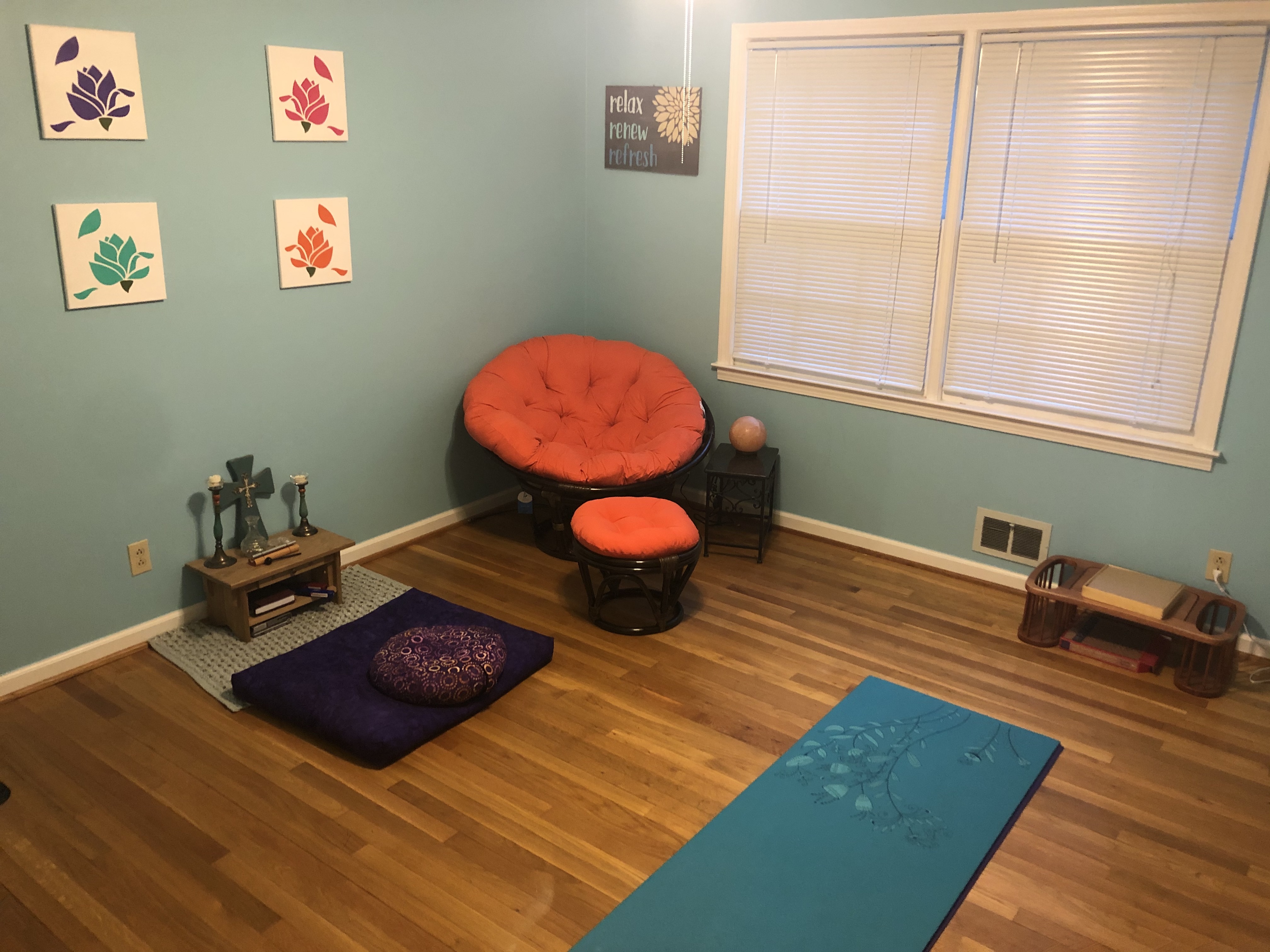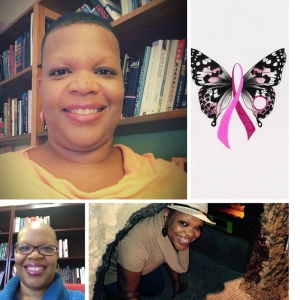This article appeared in the Summer 2010 issue of Geez Magazine.
It started in front of the mirror. I was in the bathroom, trying to figure out how to squeeze the next appointment between classes, a dissertation, and a research assistant gig. I’d pulled off some impressive scheduling maneuvers before, but in the final stages of my Ph.D. program, it was increasingly difficult.

My weekly salon visits began in my junior year of college. During a visit, my mother looked at me and asked, “When was the last time you got your hair done?” I’d mostly done it myself since freshman year. “You need to get it done every week.” Was she kidding? It took a minor miracle to stretch my paycheck for groceries and textbooks. “I’ll pay for it.” But not tuition, groceries, or books? Just like that, my priorities were ordered.
In the bathroom six years later, I estimated that I spent at least fifteen hundred annually on my hair. My graduate stipend was eleven thousand dollars. That means thirteen percent of my income went toward my hair, toward salon visits and the cabinet full of products bought in my ongoing search for the bottled miracle that would keep my always-reverting hair straight. No wonder I couldn’t give to the church. I was tithing to my hair dresser!
Suddenly I heard a voice. No, not God’s. It was my hair: “Isn’t it obvious that I don’t want to be straight?” Ridiculous, I know. Of course, my hair wanted to be straight. Why else would I endure costly and corrosive chemicals every five weeks and pay to have someone shampoo and style my hair each week in-between relaxers? “That’s the point! You have to keep going back because I don’t want to be straight!”
In some lost book of the Bible, African American women must have been given a new Decalogue. The first commandment: “Thou shalt keep thy ‘do nap-free at all times and at all costs.” African American women are likely the only racial/ethnic group in the world where the majority do not wear their hair in its natural texture. In a society gripped by racism and sexism, we are strongly discouraged from doing so. Some corporations actually have policies forbidding “ethnic” hair. An article in the August 2007 edition of American Lawyer magazine reported that a Glamour magazine staffer did a presentation for a New York law firm on the “Do’s and Don’ts of Corporate Fashion,” in which she deemed black women’s natural hairstyles “shocking,” “inappropriate,” and too “political” for the workplace.
For Alberta, a UCC minister, potential professional consequences were key in her consideration of going natural as a corporate employee twelve years ago: “To be natural was a radical approach.” Comedian Paul Mooney puts it bluntly in Hair Show, the documentary directed by Chris Rock: “If your hair is relaxed, then white people are relaxed. If your hair is nappy, then they’re not happy.” And if the professional costs aren’t high enough, there are also personal consequences. Alberta reports, “My family was against natural hair because of the stereotypes that had plagued the black community. We had to look like the ideal model – the Barbie doll – and not embrace our culture.” Another minister, Dionne, who works for a Pittsburgh community development organization, first tried going natural as a college freshman; a noticeable decrease in romantic interest from guys sent her back to the salon after just seven
months.
It is no wonder, then, that most African American girls are subjected early to harsh processes designed to break the bonds of naturally kinky hair and to transform it into straight, socially acceptable hair. According to the authors of Hair Story: Untangling the Roots of Black Hair in America, sixty-five percent of African American women use chemical relaxers or hot combs to straighten their hair. In recent years, these processes have been supplemented by methods of integrating commercial hair, including extensions, weaves, and wigs. The popularity of extensions and weaves among African American women has risen so dramatically that one comedian joked that the current generation of
Black children will never see their mothers’ real hair.
 When I was six years old, I got my first relaxer, beginning a twenty year odyssey of chemical processing (which doesn’t even include the hot combing of my early years). The results were often disastrous – burns on my scalp, neck, or ears, and damaged hair. At 27, I’d had enough. Since high school, I’d expected going natural when I was older. I imagined myself sportin’ a silver afro, not because of a dye job, but because I couldn’t fathom having the courage to do it before I was sixty.
When I was six years old, I got my first relaxer, beginning a twenty year odyssey of chemical processing (which doesn’t even include the hot combing of my early years). The results were often disastrous – burns on my scalp, neck, or ears, and damaged hair. At 27, I’d had enough. Since high school, I’d expected going natural when I was older. I imagined myself sportin’ a silver afro, not because of a dye job, but because I couldn’t fathom having the courage to do it before I was sixty.
But standing in the bathroom that morning, something came upon me. I’m not sure if it was courage; it may have been plain ol’ fatigue. The next day, I was sitting in my stylist’s chair as she trimmed away the chemically straightened ends, leaving me with the half-inch of new growth. Seeing my hair for the first time in my adult life was daunting. A persistent thorn in my flesh had been my hair’s refusal to show any sign of the racial miscegenation evident in my caramel complexion. The stuff on my head was thick, coarse, wiry, and tightly coiled. I put on a brave face, smiling in response to the stylist’s pleased expression. I walked to my car, donned a baseball cap, drove to the nearest beauty supply store, and bought a wig. It took five weeks for me to adjust to the sight of my own hair and to feel comfortable exposing it to the world.
When I did, it was like being emancipated. I was freed from a daily twenty-minute hair ritual and a weekly two-hour salon appointment. Freed to exercise anytime I wanted, not just when I could spare an hour afterward to get my hair back in shape. Freed from fear of rain (a relaxed head’s kryptonite) and the weight of the umbrellas and ponchos I carried everywhere. Freed from the bondage of constantly striving to make my hair conform to an ideal that I could never attain.
Alberta experienced a similar kind of freedom when she went natural at the age of thirty-three. “This was a spiritual journey. I embraced who I was. I began to love African American culture and history. I realized that on this journey I had a voice as an African American female. My hair was a symbol of power.”
For some African American women, going natural is just a temporary style preference. But for others, especially
those of us rooted in the traditionally conservative Black church, letting our hair exist in the way that it grows out of our head is revolutionary. It is a countercultural move, an intentional act of personal liberation from the sociopolitical powers and principalities that tell us that we are “less than.”
After her first transition to natural hair, Dionne returned to relaxers for over three years before making another attempt to go natural. “My reason for going natural the second time around was this deep desire I had to really appreciate the grain of hair that God gave me. I had been thinking a lot about what it meant for me to be made in the image of God.
One of the things I concluded was if God took the time to create me with my specific grain and texture of hair, why couldn’t I take the time to appreciate my hair in its natural state. In addition, I wanted my hair to serve as a source of inspiration for other young, black women who struggled to appreciate their hair. I wanted my hair to spark conversation that would allow me to empower women to wear their hair natural. I prayed that prayer before cutting my perm off and I can’t tell you how many opportunities I’ve had to minister to women about their hair since I’ve gone natural. I can honestly say that after three years of wearing my hair in locs, I absolutely love my hair and would never consider perming it again. I’m so proud of my God-given hair and I’m learning to appreciate it more and more!”

Although I had not anticipated it at the time, that last visit to the hairstylist marked the beginning of a journey of spiritual transformation. A few months later, I had different experience in the mirror. Arriving at work one morning, I pulled down the visor to look in the overhead mirror and discovered a pair of beautifully enormous brown eyes. For most of my life, I had spent so much time obsessing over my hair that I had never noticed my face. That morning, I drank it in, recognizing the reflections of my parents in my face, realizing how much I looked like the aunts whom I admired. In going natural, I saw myself for the first time. I realized that I was beautifully, wonderfully, and intentionally handknit by God. And I was good.




















You must be logged in to post a comment.